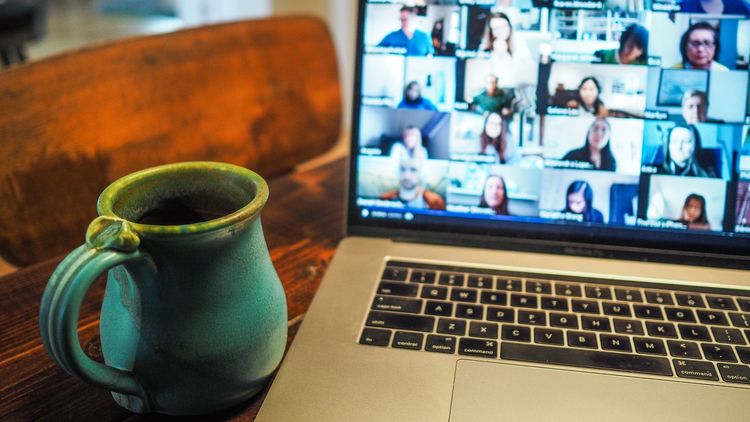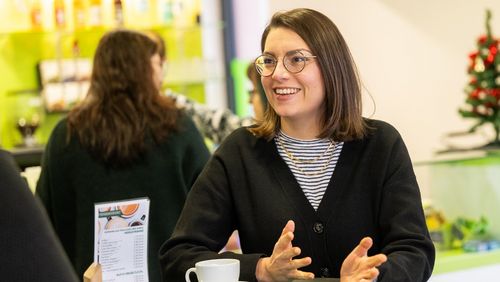Very little social contact, digital working groups and suspended stays abroad: a lot has changed also for students at the University of Oldenburg in recent months. How did they experience the past year?
The words "student life" conjure up different images in people's minds: some think of wild parties, others of heated debates at student society meetings, and many probably associate them with learning together with other students on campus. But until recently no one would have associated student life with contact restrictions and online lectures. Since last March, however, the pandemic has deprived students everywhere of many freedoms – and Oldenburg's students are no exception. They have had to forego meetings with fellow students, evenings in the pub, and in some cases also study-related stays abroad.
Yet students have found different ways to cope with the current situation. Lisa Kersten, for example, continued her semester abroad despite the pandemic. She is studying Spanish and politics/economics, and was in Guadalajara, Mexico, when the country registered its first cases of coronavirus last February. But she chose to stay on, and even extended her stay by one semester in the hope that the situation would calm down and she would be able to enjoy an "authentic" semester abroad. Things turned out differently, however.
Video conferences to counter the loneliness
When she first arrived in Mexico, Kersten had a lively social life. But as the pandemic took hold, the friends she had made increasingly withdrew to protect their families, and her flatmates also left to be with their loved ones. Loneliness set in and Kersten started making a lot of phone calls to friends and family in Germany. Then in June she moved into a house she shared with more than twenty other people, so she wouldn't feel so alone. This turned out to be the right decision: "It was nice to have people I could talk to," she says.
But not only students who are abroad are affected by loneliness. The results of a nationwide online survey conducted by the University of Hildesheim were unequivocal: 85 percent of the approximately 2,300 respondents said they missed having contact with other students, and 79 percent said they also missed life on campus. Hannah Depenbrock, a student teacher at the University of Oldenburg, feels the same way. She currently keeps in touch with her friends mainly via video conferences or the good old telephone. That helps, she says – especially now, in the dark and cold months. "Don't give up on friendships, particularly those from university, which in some cases may be relatively new," she advises. Depenbrock has found that these contacts can be especially important when those around her can't understand the problems that this new version of student life entails.
Fixed routines help
Depenbrock also avoids comparing her life to the supposedly perfect lives many people on social media lead. "You shouldn't underestimate the fact that many people are not coping well with the current situation. And that you're not alone," she says. The Mental Health Counselling Service run by the University and the Student Union can also help. Students can turn to it for support if they are having difficulties organising their studies in the pandemic – which is another widespread problem besides loneliness because digital formats give less structure to everyday life than courses held on campus.
Depenbrock found it helpful to get together with fellow students – even if only online. "I work with friends in a BigBlueButton group so as to create a bit of a library atmosphere. That way, others are checking that I'm actually working," she says. A study conducted as part of the University of Oldenburg's Teaching Profile forschen@studium shows that structures like this can help. In the summer, a student research team interviewed around 200 students about their procrastination behaviour. The results: students who integrated fixed routines into their daily life were least likely to put off tasks.
Jobless due to Covid
In addition to loneliness and a lack of structure in their everyday lives, many students also have to contend with financial worries. Haider Riaz is one of them. Born in Pakistan, Riaz came to Oldenburg in 2017 to do a Bachelor's degree in Engineering Physics. When the pandemic began he was on a semester abroad in Australia, which he had to break off prematurely. On his return he faced unforeseen problems: "When I came back to Germany I needed a job, but they were hard to find. And other types of financial support were also hard to come by," he recounts. Riaz is not the only one to encounter this problem: according to forschen@studium, more than half of the 55 international students who participated in the survey said they had had financial problems in recent months. Unlike their fellow students from Germany, most of them are not entitled to housing benefit, student loans (BAföG) or social benefits. The University's International Office now offers these students assistance on its website.
For Riaz, however, the online semester has a silver lining: since all his courses are held digitally he is currently staying with his family in Pakistan. He does miss his friends in Oldenburg, he says, "But the last time I was at home with my family was a year ago. I find it very relaxing to be here now. It gives me new energy." Now most of his social contact is with family members. Like Riaz, many students are currently spending far more time than usual with their families, as the results of another nationwide survey conducted by a team of students from Oldenburg in recent months show. The survey looked at how students' social contacts have changed in recent months. More than 1,200 students across Germany took part. The result: students currently spend most of their time with family. Friends only came second.
But despite all the changes of the last few months, there have also been some positive experiences. "I'm very grateful for my time in Mexico," says Lisa Kersten. "I met great people and learned a lot about the culture. For me, despite the pandemic it was one of the best years of my life." For her part Hannah Depenbrock says she has learned to appreciate things that she used to take for granted: "When I do get to meet up with friends now, it's something really special."




